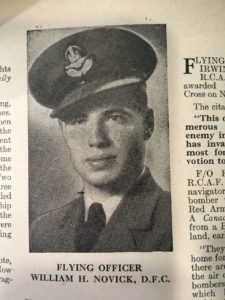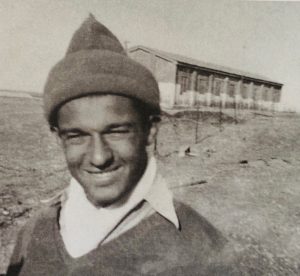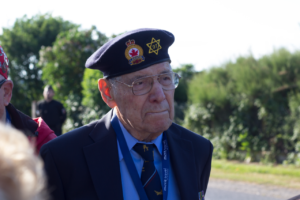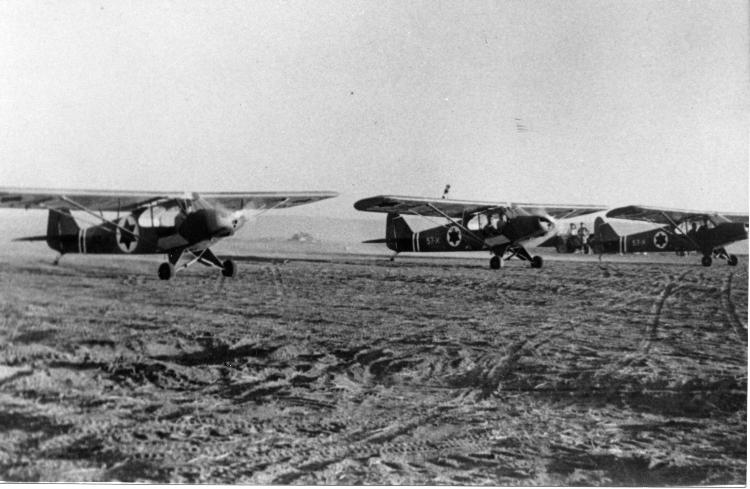Two of the surviving Canadian Machal volunteers mark 73 years since they saw action in 1948.
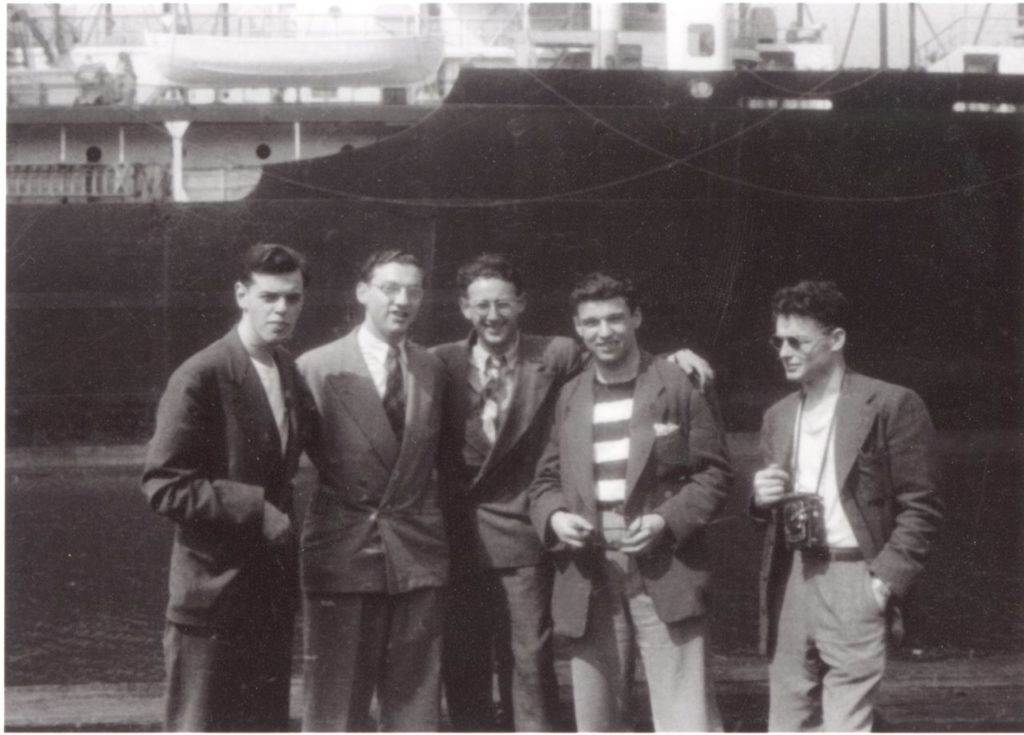
With Courtesy Canadian Jewish News (CJN) and Ellin Bessner – see source https://thecjn.ca/canadas-last-surviving-machal-fighters-mark-the-1948-israel-war/
Listen also to a podcast interview with Bill Novick (97) and Irving Matlow (95).
Canada’s last surviving Machal fighters mark the 1948 Israel war
by Ellin Bessner
July 13, 2021
Want some advice about how to solve the current Israel-Palestinian problem? Why not ask two Canadians who were there, back when it started?
It has been 73 years since a pair of Canadian Jewish university students found themselves in the thick of Israel’s 1948 War of Independence. Bill Novick of Montreal and Irving Matlow of Toronto were among the thousands of foreign “Machal” volunteer fighters who made their way clandestinely overseas to help the fledgling State of Israel defend the new country from invading Arab armies.
Machal is an acronym of the Hebrew name for the program that attracted 4,000 military “Volunteers from Abroad” during the period from 1947-1949. Jews and non-Jews signed up, including 300 Canadians. Matlow and Novick are among the remaining handful in Canada who are still alive.
Answering the call
Novick, now 97, was already a decorated Second World War pilot and was taking premedical studies at McGill University when he was recruited to join the Jewish underground. His contact was Sydney Shulemson, the most highly decorated Jewish Canadian RCAF fighter ace.
“They were desperately looking for Jewish guys and girls who had more experience in the Second World War to come and join and fight for Israel, because there was no doubt about it that there was going to be an invasion by the surrounding Arab countries,” Novick told The CJN from his home in Montreal. “I agreed to go.”
Matlow had been too young to fight Hitler, but in early 1948, the committed Zionist attended a recruiting meeting at the Brunswick Avenue Talmud Torah in Toronto, organized by representatives from the Haganah, one of Israel’s military organizations operating before the state was founded. Matlow didn’t expect to be selected.
“We had no military experience except from high school, that we used to line up and march, and then go down to the armories to have the march past,” Matlow recalled, with a laugh. But in May 1948, Matlow and a group of other Jewish volunteers passed their medicals, then left for New York, from where they sailed with false passports to Le Havre, France, for basic training. The next stage was to board a converted freighter headed for Haifa. The sea journey took several weeks before arriving in Israel by the end of June. Then it was enlistment in the Israel Defense Forces.
Seeing action
Although there had been plenty of violence between Jews and Arabs in Palestine before the British Mandate ended on May 14, 1948, as soon as the State of Israel was declared that Friday, the surrounding Arab countries moved quickly to invade. Fighting continued until May 29, when the U.N. brokered the first ceasefire.
Matlow’s battlefield experience began after the ceasefire expired on July 8, 1948. But Novick had already been pressed into service to help bring airplanes from overseas to build an Israeli Air Force. Despite an arms embargo imposed by the British and the Americans banning weapons sales to Palestine, (and the American ban covered the Arab side, as well) neither forces respected the ban. Israeli operatives inked deals to buy some serviceable transport planes from the Americans, and get them to the Caribbean in June.
Thus began the vital but illegal airlift of arms and fighter plane parts into the Jewish State. With Novick’s record of flying 30-plus night time bombing raids over Nazi-occupied Germany, his experience was soon put to use. He was sent from Montreal, via New York, to Puerto Rico to pick up a salvaged U.S. air force B-17 aircraft. Although he hadn’t flown a plane in three years, a quick refresher was enough to land him in the co-pilot’s seat together with an international crew of Machal volunteers en route to Czechoslovakia.
Arms airlift Czech suppliers sold an estimated $15 million worth of surplus airplanes and weapons to Israel. These were loaded onto Novick’s giant transport plane and flown in a roundabout way, via Corsica and Crete, and smuggled into Israel. The route was repeated many times, and was dangerous.
“On one of the trips I developed engine trouble and I had to make a forced landing in Italy,” Novick explained, adding that they were flying under the flag of Panamanian Airways. “The Italian police knew exactly what we were doing, and they confiscated the plane and I spent a night in jail.”
Eventually some Haganah operatives arrived with bribes and managed to have Novick and the other crewmates released. “It was the first four or five Messerschmitts that were flown into Israel and that really attacked the Egyptian army only 20 miles from Tel Aviv and I think turned the tide of battle in that area,” Novick said.
Later, he would be sent to oversee another weapons airlift in the southern part of the country, flying in and out of the Ruchama air base in the desert near modern-day Sderot. “If you want to know what it’s like out here, crawl into a blast furnace and you’ll get a good idea,” Novick wrote home in a letter cited in the 1983 book about Canadian Machal fighters, The Secret Army, by David Bercuson.
Clearing the Galilee
Irving Matlow served as a signaller with B Company of the 72th Battalion in the 7th Brigade. His outfit was where Israel’s military commanders sent most of the English speaking volunteers from Canada, the USA, Great Britain and elsewhere. Under the leadership of Ben Dunkelman, a former Toronto menswear magnate who had served with distinction in the Second World War, the brigade captured much of central Israel and the Galilee.
Matlow said he was not involved in the fighting to capture Nazareth on July 16, 1948. However, he recounts how Dunkelman refused to obey orders to expel the 40,000 Arab residents of the town, including refugees who had fled Israeli advances elsewhere. “I think he made his own decision…not to force them to leave their homes and their farms or whatever it was, and so Nazareth still remained a Christian Arab society,” Matlow said.
Forced evictions of Palestinian Arabs
Matlow is acutely aware of accusations that Jewish troops forcibly expelled resident Palestinian Arabs from scores of villages captured during the 1948 war, sparking a refugee
problem that exists to this day for modern Israel.
“The truth is, it was a mixture of both their own leadership telling them to go away, [and] also the importance of having the [captured] land join together,” Matlow said. “And those times were different, and perhaps today maybe we could be a little more liberal because Israel is so strong, maybe we could do something.”
Novick doesn’t support the continuing occupation by Israel of parts of the West Bank for all these years since Israel captured it in 1967, but he is unapologetic about the actions of the Jewish forces in the 1948 war. “The Israelis could not be faulted. They were being attacked by five Arab countries, they had a significant population within their own borders that, really, were actually trying to prevent the establishment of the State,” Novick said. “Look how they blocked the road to Jerusalem. Jerusalem was almost starved into submission in 1948. All this seems to be forgotten by many people who criticize Israel.“
How to solve the Palestinian problem?
While Novick sees having the West Bank become an autonomous entity associated with Jordan as one possible solution to today’s conflict, he admits the idea is “far-fetched.”
“After all they have a lot in common, but would this ever happen? I couldn’t say.” Matlow thinks the idea of a Palestinian State is not workable, and predicts it will be off the table as the new Israeli government of Naftali Bennett has more solvable pressing domestic matters to deal with at the moment, including the economy, and COVID recovery.
Both veterans are watching with alarm the rising tide of anti-Semitism that has been unleashed worldwide when the recent hostilities erupted in May between Israel and Hamas in Gaza. Meanwhile, on the West Bank, there were clashes in Jerusalem over ongoing legal battles that would allow the eviction of Palestinians from their homes in the Sheikh Jarrah neighbourhood.
Concerned about rising anti-Semitism Canada itself saw a spike in anti-Semtism both online and in real life, with Jewish businesses being targeted in Montreal, a Tik Tok video by students in Waterloo, Ontario encouraging stabbing of the Israeli flag, and actual physical assaults in major cities. Canada’s Jewish Students feel a Deluge of Hate Western University asked to ban pro-Zionist narrative from campus
“Look there are various reasons, maybe they’re better organized,“ Matlow said, referring to anti-Israel activists in Canada, particularly among campus student governments. Last month, the Muslim Students Association at the University of Western Ontario in London called for the removal of “all pro-Zionist” narrative from the campus, because they argued it makes Palestinian students feel unsafe. Novick thinks one of the reasons why Israel and the Jews are losing the public relations campaign is a generational divide.
“Israel functions well but I’m afraid it doesn’t bode well for the future, especially for young Jews in the Diaspora who seem to have less of an attachment to Israel than our generations did.”
Focus on Jewish young people
Novick enlisted in the RCAF when he was 18, and joined the IDF at 24. Matlow joined the IDF when he was 21.
They both are calling for more resources to be devoted to helping young Canadian Jewish students learn to be effective campaigners on the new battlegrounds of anti-Semitism today: on social media platforms, and university campuses.
“I would like to see our students become more involved on a pro-Israel basis. They have to be given leadership, they have to have facts on the ground to know how to counteract the anti-Israeli rhetoric which actually is anti-Semitic,” Novick suggested.
“You have to meet face to face with the people and talk to them face to face, that’s the only way you’re going to change their attitudes,” Matlow added, speaking about relations with opponents of Israel and those who support boycotts and other economic sanctions. “As far as our own students are concerned, you have to get them, maybe, involved more in the Hillel or other Jewish organizations,” he said, urging Jewish community leaders to take
his advice seriously. “That’s a task you need to concentrate on.”
Helped birth the Jewish State
Despite their concerns, Novick and Matlow are both proud of having played their part in the birth of the State of Israel. Matlow wrote about his experiences in the Israel Defense Forces in a novel entitled “At the Family Table”, which was published in 2018. He is working on a second volume.
“It’s a success story that we had part of it, a little bit, in making it a success,” he said. Matlow has been credited for saving the lives of several of his platoon members during the fighting for the capture of the Sasa Junction in October 1948. It was part of Operation Hiram, the sweeping drive under Ben Dunkelman’s command to push the Arabs out of the Galilee and back across the Lebanese border.
One day, Matlow’s platoon came under fire by troops from the Arab Liberation Army. Matlow’s quick radio message for help saved the life of his American commanding officer, Norman Schutzman. However, an Israeli-born officer, Lt. Zacahria “Aya” Feldman, was killed. “I think several lives were saved and that makes me very proud of having participated,” Matlow said.
Hopeful for Israel’s future
Both Machal veterans went on to build successful lives in Canada after they returned home. Novick left in September 1948 to attend medical school, and just recently retired, at age 96, from his medical career as an ear, nose and throat specialist in Montreal. Matlow departed after the armistice was signed in July 1949, ending the war. He took up the reins of his family’s dry goods business on Toronto’s Spadina Avenue, and ran it alone after his
parents immigrated to Israel in 1955. One of his children is prominent Toronto lawyer and Herzl expert David Matlow, who is a regular contributor to The CJN with his weekly Treasure Trove column.
Novick and Matlow have continued to visit Israel regularly, despite their advanced ages. They are both hopeful that peace in the Middle East will come, even after they are not around to witness it. “Look, there are no countries that don’t have any problems, and we have the Indigenous problem in Canada,” Matlow said. “Let’s see what happens after we celebrate the 100th year anniversary of the State of Israel,
